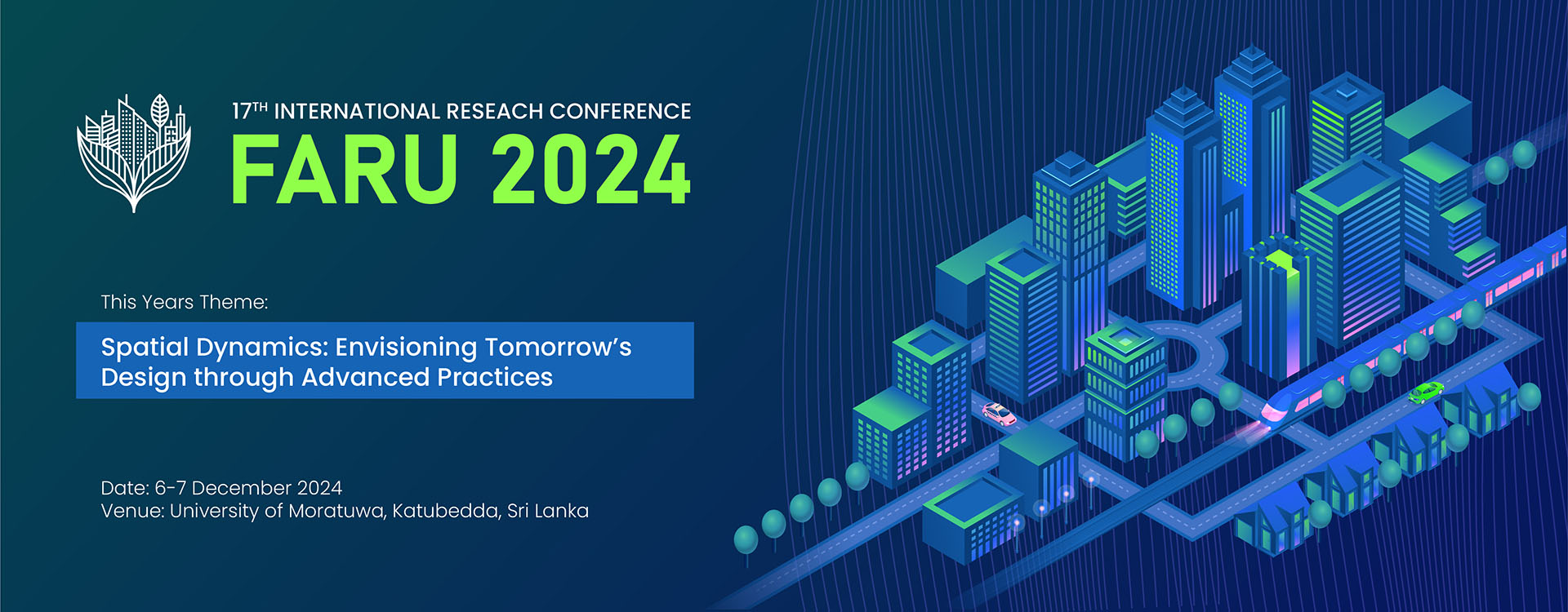
About
FARU Conference is an international annual conference that has been conducted by the Faculty of Architecture Research Unit of the University of Moratuwa, Sri Lanka since 2009. This international conference aims to provide a platform to discourse theoretical or empirical studies through discussions, debate across disciplines and to foster networking and long-term collaboration among the conference delegates.
The overarching theme of FARU conference is ‘Dimensions of Space’ where it discusses fundamental and applied research on ‘space’ and different dimensions of it within the discipline of Built Environment, Town and Country Planning, Building Economics, Design and Facilities Management. FARU interprets ‘space’ as ‘research space’ that support wide range original research on methodological and technical approaches including experimental, observational, monitoring and management studies and, policy analysis related to the environmental performance of the built environment ranging from cities, communities, buildings, building systems, building science, urban physics, and human interaction.
Each conference proceeding is published with an ISBN number until 2020. Since year 2021 FARU Conference Proceedings was published with an ISSN 2815-0384 and an eISSN 2806-0392.
FARU Conference Review Process
The full peer review process consists of two stages, through which manuscripts may progress:
1. Stage One – Initial Screening of New Submissions:
Manuscripts are initially screened based on the following key factors:
- Scope: Appropriateness for publication in FARU.
- Originality: Uniqueness and novelty of the manuscript material.
- Clarity: Clarity in presenting research and findings.
- Completeness: Accuracy and completeness of data interpretation.
- Relevance: Significance of the manuscript to the mentioned disciplines and their fields of study. Manuscripts exhibiting exceptional quality proceed to the next stage.
- Format: Adherence to the formatting and referencing guidelines
Plagarism Check: The submitted manuscripts will undergo a similarity check and necessary actions will be taken to ensure the plagirism policy is adhered before the paper is considered for the review.
The manuscripts that fails the stage 1 initiate screening will either be declined or returned to authors.
2. Stage Two – Peer Review:
Manuscripts that pass the initial screening undergo double blind peer review by two-three independent reviewers. The FARU committee considers comments from the peer reviewers and makes decisions such as:
- Accept
- Minor Revision
- Major Revision
- Reject
Authors are informed of the decision at this stage and are expected to submit a revised version addressing the reviewer comments, if applicable.
Additionally, authors should submit a table outlining the responses to the reviewer comments.
The revised manuscript will be checked by the FARU committee to ensure that the comments are satisfactorily addressed by the authors before accepting the paper for publication.
This information is visually represented on the website and can be accessed via the provided link.
This structured approach ensures transparency and fairness in the review process while maintaining the quality and integrity of FARU publications.
FARU Publication Ethics and Publication Malpractice Statement
Faculty of Architecture Research Unit (FARU) publications is committed to publishing and widely disseminating high-quality content. It is necessary to agree upon standards of expected ethical, behaviour for all parties involved in the act of publishing: The author, the journal editor, the peer reviewers, and the publisher. Our expectations are that all involved have a shared understanding and acceptance on FARU publication ethics and malpractice. Our ethic statements are based on COPE’s Best Practice Guidelines for Journal Editors available at https://publicationethics.org
Duties of the Editor in Chief(EIC) OR Guest Editor (GE)
The editor in chief’s or guest editor’s responsibility is to determine which submission to the journal will be published. The EIC/GE must ensure that decisions are made on the basis of the manuscript’s merit and that the author’s race, gender, religious or political beliefs, ethnicity, or citizenship are not considered.
Confidentiality
The editor in chief and any editorial staff must not disclose any information about a submitted manuscript to anyone other than the corresponding author, reviewers, potential reviewers, other editorial advisers, and the publisher, as appropriate.
Disclosure and Conflicts of Interest
Reviewers will not use unpublished information disclosed in a submitted manuscript for their own research purpose without the author’s explicit written consent. Reviewers must recuse themselves from reviewing manuscripts in which they have conflicts of interest.
Duties of Reviewers
- Purpose of Peer review
Peer review assists the editor in making editorial decisions and through the editorial communications with the author may also assist the author in improving the quality of the submission.
- Promptness
A potential reviewer should withdraw from the review process if unqualified to assess the contribution or cannot provide an assessment in a timely manner as defined by the editor.
- Confidentiality
Any manuscripts received for review must be treated as confidential documents. Information concerning the manuscripts should not be discussed with others without the approval of the editor.
- Standards of Objectivities
Reviewers should be conducted objectively. Personal criticism of the author is inappropriate. Reviewers’ comments should be clearly expressed and supported by data or arguments.
- Acknowledgement of sources
Reviewers should identify relevant published work that has not been cited by the authors. Any statement that an observation, derivation, or argument had been previously reported should be accompanied by the relevant citation. A reviewer should also call to the editor in chief’s attention any substantial similarities or overlap between the manuscript under consideration and any other published paper of which they have personal knowledge.
- Disclosure and Conflict of Interest
Privileged information or ideas obtained through peer review must be kept confidential and not used for personal advantage. Unpublished information disclosed in a submitted manuscript should not be used by the editorial committee members without the prior approval of the author’s explicit written consent. reviewers should not consider manuscripts in which they have conflicts of interest resulting from competitive, collaborative, or other relationships or connections with any of the authors, companies, or institutions connected to the manuscript.
Duties of Authors
- Reporting standards
Authors of original research reports should present an accurate account of the work performed as well as an objective discussion of its significance. Underlying data should be represented accurately in the paper. A paper should contain sufficient detail and references to permit others to replicate the work. Fraudulent or knowingly inaccurate statements constitute unethical behavior and are unacceptable.
- Data access and retention
Authors could be asked to provide the raw data of their study together with the paper for editorial review and should be prepared to make the data publicly available if practicable. In any event, authors should ensure accessibility of such data to other competent professionals for a reasonable time after publications (preferably via an institutional data repository or other data center).
- Authorship of the paper
Authorship should be limited to those who have made a significant contribution to the conception, design, execution, or interpretation of the reported study. All those who have made significant contribution should be listed as co-authors. Where there are others who have participated in certain substantive aspect of the research, they should be acknowledged or listed as contributors. The corresponding author should ensure that all appropriate co-authors and no inappropriate co-authors are included on the paper, and that all co-authors have seen and approved the final version of the paper and have agreed to its submission for publication.
- Originality, Plagiarism, and acknowledgement of sources
The authors should ensure that they have written entirely original works and will appropriately cite or quote the work and/or words of others. Publications that have been influential in determining the nature of the reported work should also be cited.
- Multiple, Redundant, or Con current Publication
An author should not in general publish manuscripts describing essentially the same research in more than one journal or primary publication. Submitting the same manuscript to more than one journal concurrently constitutes unethical publishing behavior and is unacceptable. Manuscripts which have been published as copyrighted material elsewhere cannot be submitted. In addition, manuscripts under review by one journal should not be submitted to other publications while the manuscript is under review.
- Disclosure and Conflict of Interest
The authors should disclose in their manuscript any financial or other substantive conflict of interest that might be construed to influence the results or interpretation of their manuscript. All sources of financial support for the project should be disclosed. Readers should be informed about who has funded research and on the role of the funders in the research.
- Fundamental errors in published work
When an author discovers a significant error or inaccuracy in his/her own published work, it is the author’s obligation to promptly notify the journal editor or publisher. If the editor or the publisher learns from a third party that a published work contains a significant error, it is the obligation of the author to promptly retract or correct the paper or to provide evidence to the editor of the correctness of the original paper.
Open Access Policy, Self-archiving Policy, Copyright
- Self-archiving Policy
FARU Publications allows authors to deposit Publisher's version/PDF in an institutional repository and non-commercial subject-based repositories or to publish it on Author's personal website (including social networking sites, such as ResearchGate, Academia.edu, etc.) and/or departmental website, at any time after publication. Full bibliographic information (authors, article title, journal title, volume, issue, pages) about the original publication must be provided and a link must be made to the article's DOI.
- Copyright
Authors retain copyright of the published papers and have the right to use the article in any subsequent book, article, or other scholarly work of which you are an author or an editor, provided that appropriate credit is given to FARU.
FARU Conference Proceedings
Previous FARU Conferences
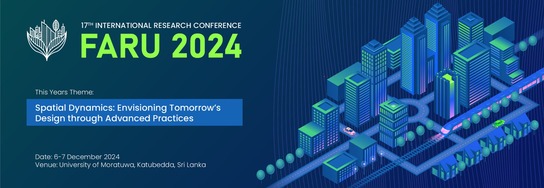
Keynote Speaker
Professor Kaushal Keraminiyage
University of Salford, United Kingdom
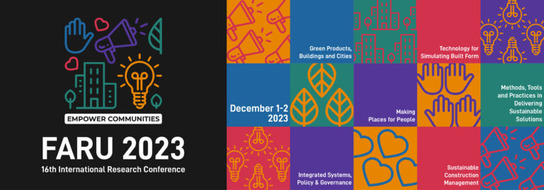
Keynote Speakers
Professor Charles Egbu
Vice Chancellor, Leeds Trinity University, United Kingdom.
Professor Hisham Elkadi
University of Salford, United Kingdom
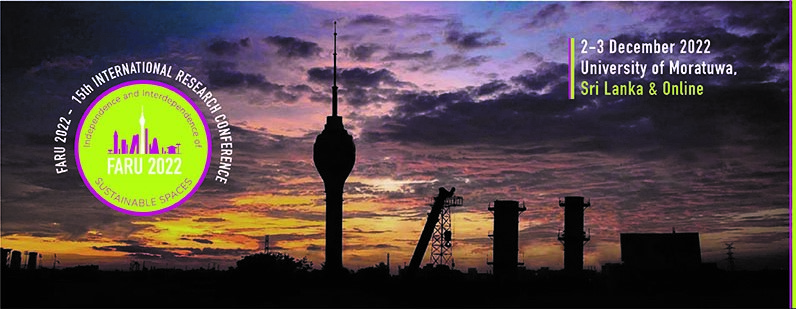
Keynote Speaker
Dr. Ajanta Sen
IIT Bombay, Industrial Design Centre, IIT Visiting staff International Director of Solar Project, NUS, Singapore Advisor, Indian Architect and Builder (IA&B), India.

Keynote Speaker
Professor Udo J. Becker
Institute for Transport Planning and Road Traffic, Dresden University of Technology, Germany
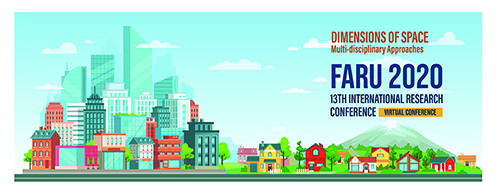
Keynote Speakers
Professor Abraham George
Indian Institute of Technology Kharagpur, India
Professor Bingunath Ingirige
University of Salford, UK
Professor Oscar Carracedo Garcia - Villalba
National University of Singapore

Keynote Speaker
Professor Jürgen Reichardt
Munster School of Architecture
Dept. for Building Construction and Industrial Building, Germany
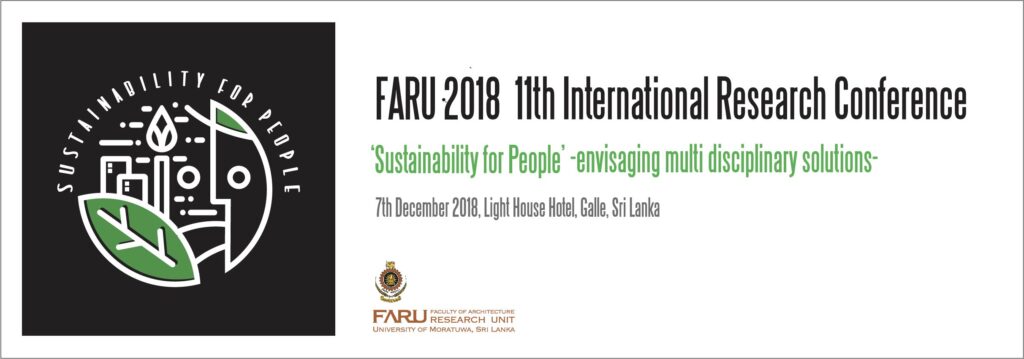
Keynote Speaker
Professor Samitha Manawadu
University of Moratuwa, Sri Lanka
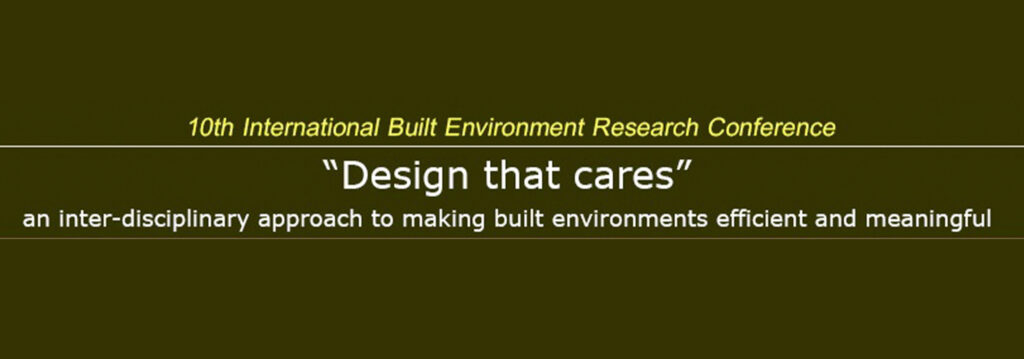
Keynote Speakers
Professor Susan Roaf
The University of Cambridge, UK
Professor Geoffrey Qiping Shen,
The Hong Kong Polytechnic University
Dr. Katherine Moline
University of New South Wales, Australia
Prof. Arun Gupta
National Institute of Design, India
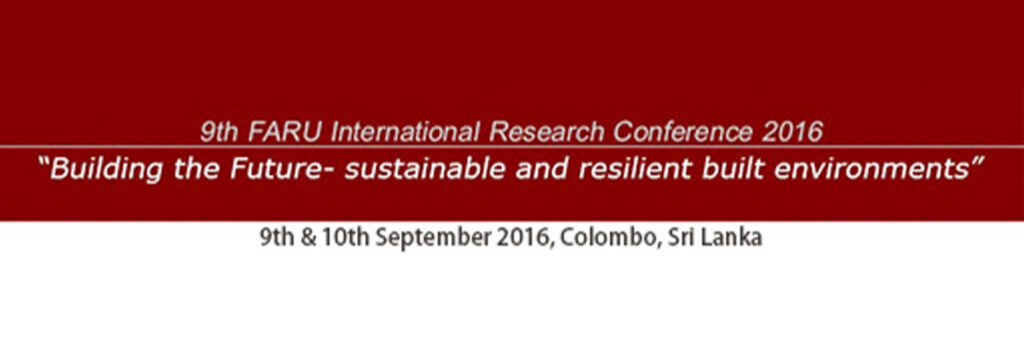
Keynote Speakers
Professor Koen Steemers
The University of Cambridge, UK
Prof. Amal S. Kumarage
University of Moratuwa, Sri Lanka
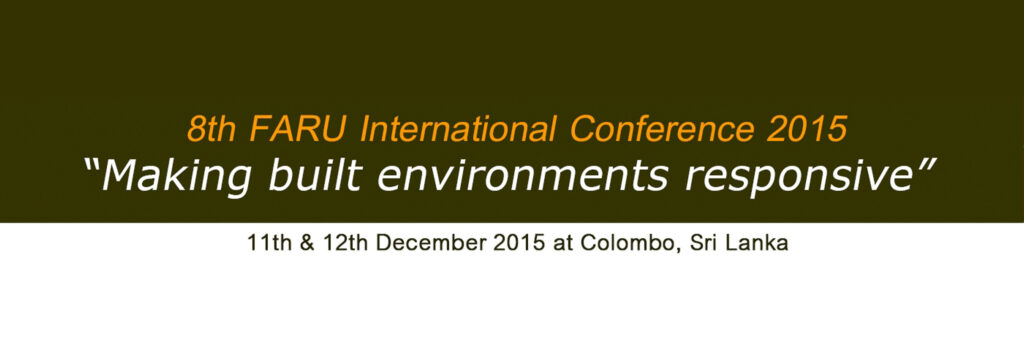
Keynote Speaker
Professor Marc Aural Schnable
Victoria University of Wellington, New Zealand
Professor Jurgen Reichardt
Reichardt-Maas-Associated Architects GmbH & Co. KG in Essen, Germany
Professor Saroj Jayasinghe
University of Colombo, Sri Lanka
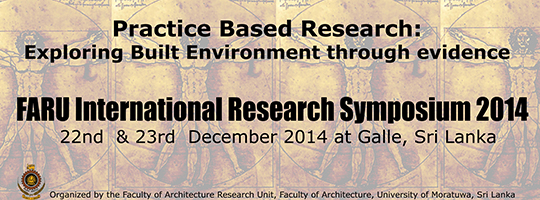
Keynote Speaker
Mr. Pradyumna Vyas
Director, National Institute of Design, India
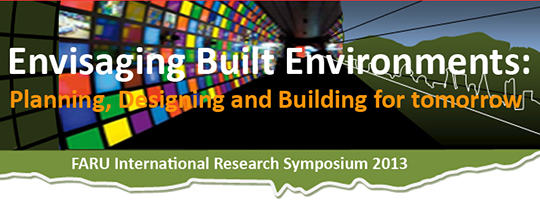
Keynote Speaker
Professor Fergus Nicol
Oxford Brookes University, United Kingdom
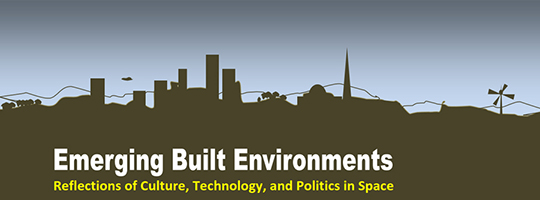
Keynote Speakers
Professor Jon Lang
University of New South Wales, Australia
Professor Richard Hyde
University of Sydney, Australia

Keynote Speakers
Rev. Dr. Charles Doige, The Leicester
School of Architecture, De Montfort University, Leicester, UK
Prof. Paolo Tombesi
University of Melbourne, Australia
Prof. Juhani Pallasmaa
University of Technology, Helsinki, Finland.
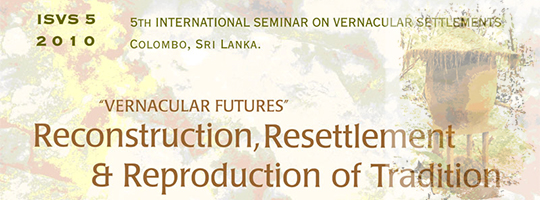
Keynote Speakers
Prof. Paul Oliver
Oxford Brookes University, United Kingdom
Dr. Roland Silva
Sri Lanka
Dr. Peter Kellert
Newcastle University, UK
Prof. Claudia Estrela Porto
University of Brasilia, Brazil
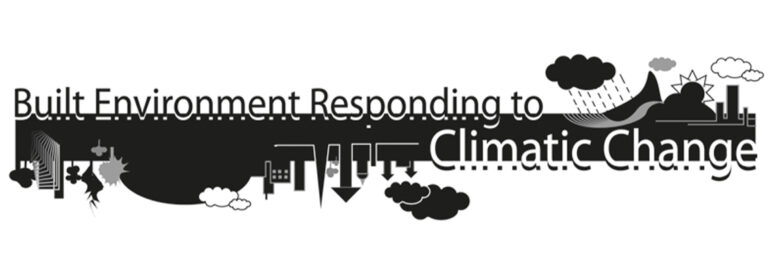
Theme
Built Environment and Its Futures
Keynote Speaker
Archt./Plnr. Deshabandu Surath Wickramasinghe, Sri Lanka
